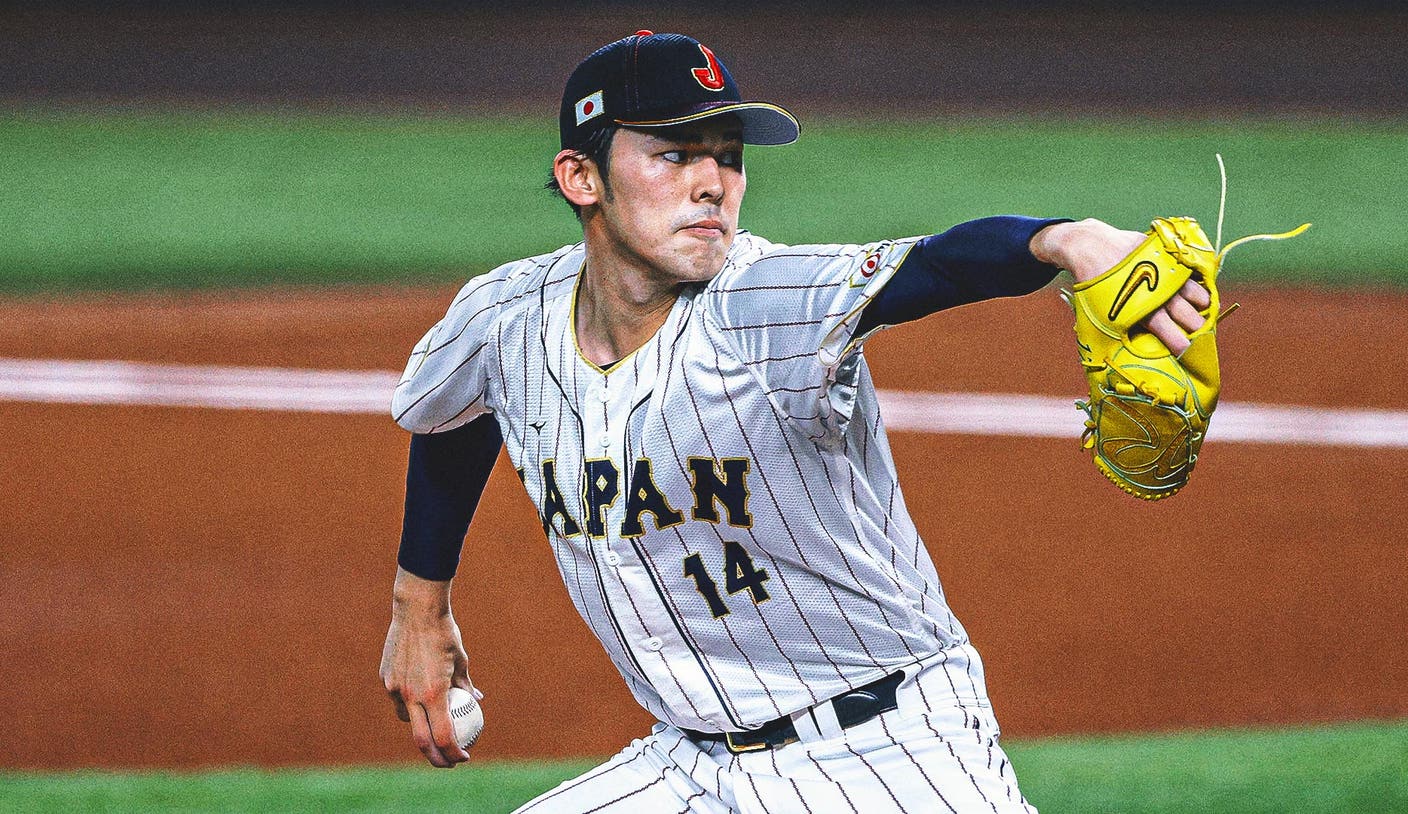
DALLAS — The Roki Sasaki sweepstakes has begun.
The top international free agent was officially posted this week, opening a 45-day window for teams to make their pitches to the 23-year-old flamethrower from Japan.
Sasaki’s agent Joel Wolfe, speaking from the Hilton Anatole at MLB’s winter meetings, said the process will be “open-ended.” Wolfe expects to meet with Sasaki in the next couple of days and then map out a schedule to meet with teams, likely starting next week. Those meetings will take place in a central location first before Sasaki potentially begins visiting “a few isolated places” in a second round of meetings.
The 2024 international signing period ends Dec. 15. Sasaki is expected to sign during the 2025 international signing period, which begins Jan. 15. Every team will then have somewhere between $5-8 million to work with as bonus pools reset.
“Teams have already begun sending presentations, both in video and powerpoint, PDF-form, that sort of thing,” Wolfe said, estimating that he has seen three or four so far. “But we didn’t give teams a hard deadline to submit that information because we want them to be able to put the time in to do it right.”
For a quick refresher, this won’t be like Yoshinobu Yamamoto’s situation a year ago when he signed for 12 years and $325 million, earning the biggest contract ever for a pitcher.
Sasaki might’ve commanded something similar if he were available on the open market, but because he is not yet 25, he is subject to international amateur free-agent restrictions. That means he can only sign a minor-league deal from a team’s international bonus pool. He is widely considered to be one of the top pitchers available, and he will come at a fraction of the cost of most free agents, opening the door for every team to make its pitch. Wolfe estimates that “at least half the league” has scouted Sasaki in Japan this year.
Here’s some of what Wolfe had to say about how the process will work, what we know about Sasaki and what we can expect over the next 45 days.
Why is Sasaki signing now instead of waiting until he’s 25 and can make significantly more money?
It’s a question that’s difficult for Wolfe to answer.
“Some of it is Japanese culture, some of it is just Roki Sasaki,” Wolfe said. “There are no absolutes in baseball, and through Roki’s eyes, there are no absolutes in life.”
Wolfe said the tragedies Sasaki has dealt with — when he was 9, Sasaki lost his father and grandparents in the tsunami that resulted from the devastating 2011 earthquake — have shaped his life perspective. He doesn’t take anything for granted.
“It is not an absolute lock, as some people in baseball have assumed, that two years from now he’s going to get a Yamamoto contract,” Wolfe continued. “Baseball just doesn’t work that way. If you look at the epidemic of injuries that pitchers here suffer, they have the same potential issues. He could have Tommy John surgery. He’s had two shoulder injuries. He’s had oblique injuries. Things may not go the way they want.”
In addition, Sasaki’s experience pitching in the World Baseball Classic intensified his desire to make the leap.
“It’s always been his dream to come to the major leagues since he was in high school,” Wolfe said. “He has grown up idolizing players like Yu Darvish and [Masahiro] Tanaka and [Daisuke] Matsuzaka. This is something he’s always wanted to do, and when he went to WBC and he was around some of these major-league players, it really rubbed off on him that he became sure that, ‘This is what I want to do as soon as possible,’ and it just further solidified his decision-making process.”
Wolfe said Sasaki doesn’t yet know much about the individual teams and cities. He has encouraged Sasaki to enter the process with an open mind and categorically denied any speculation that a handshake deal has already been made, despite wide speculation that the Dodgers, who employ Sasaki’s WBC teammates Yamamoto and Shohei Ohtani, are the favorites.
“There were some accusations, allegations, all of them false, made about predetermined deals, things like that,” Wolfe said. “However, MLB rightly wanted to make sure this was going to be a fair and level playing field for everyone. So, they did their due diligence and interviewed numerous parties ahead of time to make sure that was the case. And they wanted to make sure that Roki would most likely, while he would have the opportunity to sign in ‘24, give himself the best opportunity to get the best deal for him and for Chiba, and that Chiba would also have that opportunity. So, it made sense to post at this time so he could go into the ‘25 pool when the teams will have much more substantial international bonus money.”
Does that mean teams with more international bonus pool money have an upper hand?
“Given the gap in the bonus pool amounts is so negligible, my advice to him is, ‘Don’t make a decision based on that,'” Wolfe said, “because the long-term arc of your career is where you’re going to earn your money. So, it’s probably not advisable to make a short-term decision in that regard.”
So, what is most important to Sasaki?
Wolfe is still getting a feel for that.
He has known Sasaki “for a little over two years now” and said “it has been a little bit difficult to really ascertain what his decision-making process would be for choosing a team because his focus has been predominantly on whether or not he’s going to be able to post.”
Now, that obstacle is out of the way.
The Chiba Lotte Marines, Sasaki’s NPB team, announced in November that they would begin the posting process — to the surprise of many, considering the posting fee that they will receive will be significantly less than what they would have gotten had they waited until Sasaki was 25 — but Wolfe didn’t know until a few days ago when it would officially happen.
Wolfe said Sasaki has asked “for a broad range of information” and “to suggest information about different teams and regions that we think might be beneficial to him.”
“The best I can say is, he has paid attention to how teams have done, as far as overall success both this year and years past,” Wolfe said. “He does watch a lot of Major League Baseball. He has paid attention to what his WBC teammates have done. He’s talked to a lot of players, foreign players, that have been on his team with Chiba Lotte. He has asked a lot of questions about weather, about comfortability, about pitching development. And just watching what other Japanese players in the major leagues are doing and how they are doing.”
Does that mean he would be more open to joining a team with Japanese players?
Dating back to the pursuits of Kodai Senga and Yamamoto, many teams asked Wolfe whether having Japanese players already on their team would be an obstacle or an attraction for his Japanese clients.
“And it’s different for every single player,” Wolfe said. “Each player is unique in how they feel about it, and I think it also matters on the player that is already on the team, how much do they reach out to other Japanese players? How are they perceived by this particular Japanese player? And it just varies player to player.”
So, is it more of an attraction for Sasaki?
“It could be, to have an older player to help show him the ropes,” Wolfe said. “But anyone that knows Roki Sasaki, this is one of the most driven, intense players I’ve ever known and been around, and I wouldn’t say he would necessarily need it to succeed.”
Do West Coast teams have an advantage?
“He’s never brought that up as an issue,” Wolfe said. “When we supply information to our players, our Japanese players, long before they come over here, one of the things that we provide for them is direct flights from Japan and the amount of time it takes for family to come and visit you. I think about five or 10 years ago that was something that maybe they weighed a little bit more, but now you can fly direct from Japan to most of the major cities in the U.S. It’s not really that much of an issue anymore.”
Asked how the Padres would fit, considering Sasaki’s admiration for Darvish, Wolfe said he assumed “that would be a team that he would seriously consider.”
Wolfe added that he hasn’t talked to Sasaki about his relationship with Ohtani.
Do smaller or mid-market teams have a chance?
“Yeah, absolutely,” Wolfe said. “I think that there’s an argument to be made that a small or mid-market team might be more beneficial for him as a soft landing coming from Japan, given what he’s been through and not having an enjoyable experience with the media. It might be … I’m not saying it will be, but I don’t know how he’s going to view it, it might be beneficial for him to be in a smaller market. But I really don’t know how he looks at it yet because I haven’t had a chance to really sit down and discuss it with him in great detail.”
Wait, what’s the situation with the media in Japan?
“The media in Japan has been very tough on him, and he’s not had a great time with it,” Wolfe said. “My personal opinion is that it’s been a bit unfair, and it’s affected him mentally a little bit.”
Wolfe later elaborated on those issues: “There’s been a lot of negativity in the media directed at him because he has expressed interest at going to play for MLB at such a young age. That’s considered in Japan to be very disrespectful and sort of swimming upstream. There’s been a lot of things … a lot of people jumped on board there creating some false rumors about him and his family. It was very detrimental to his mental state.”
Would all of that rule out a place like New York?
“He hasn’t said anything negative about any particular city, and he actually hasn’t said anything overly positive about it,” Wolfe said. “We haven’t had any detailed discussions about particular cities yet. But I think he can handle it, just based on what I’ve seen.”
When will Sasaki make his choice?
While the signing won’t take place until at least Jan. 15, it’s possible Sasaki makes his decision before then.
“The incentive to sign as early as possible is to get the visa process going so that he would be on time for spring training,” Wolfe said. “So, the earlier we make a decision, the better. Nobody would want him to be showing up late to spring training.”
Rowan Kavner is an MLB writer for FOX Sports. He previously covered the L.A. Dodgers, LA Clippers and Dallas Cowboys. An LSU grad, Rowan was born in California, grew up in Texas, then moved back to the West Coast in 2014. Follow him on Twitter at @RowanKavner.
[Want great stories delivered right to your inbox? Create or log in to your FOX Sports account, follow leagues, teams and players to receive a personalized newsletter daily.]
Get more from Major League Baseball Follow your favorites to get information about games, news and more



